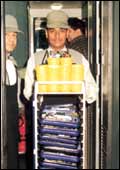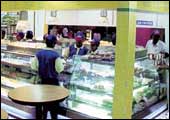 |
| M.N. Chopra, MD, IRCTC: Railway catering
is a lucrative business |
|
IRCTC By The Numbers
|
Turnover*: Rs 300 crore
Number of trains managed: 60
Number of food plazas: 6
Revenue from food plazas:
Rs 30 crore
No. of empanelled
caterers for trains: 40
Average number of meals served per day: 1.5
lakh
*Estimated for 2002-03 |
On
a hot mid-May Friday, which happens to be a Central Government holiday
on account of Buddha Purnima, Mahendra Nath Chopra, dressed in casual
attire and wearing tan-coloured sandals, decides to go on a 250-kilometre
drive up to Chandigarh in his Tata Indigo. That certainly isn't
the best way to enjoy the extended weekend break-especially when
the temperatures are nudging the mid-40s in the shade. But for the
56-year-old Managing Director of the Indian Railways Catering and
Tourism Corporation (IRCTC), the time is as good as any to be doing
the rounds.
For one, it is the holiday season and the small
and mid-sized railway stations along the northern route are bustling
with passengers. If Chopra wants to get a feel of the travellers'
spending pattern and choice of food, this is likely to be the best
time. For another, come June, IRCTC will have catering responsibility
for another 220 trains, in addition to the 60 it already feeds.
In terms of meals served, that'll take the number up from 1.5 lakh
currently to a staggering 7-8 lakh.
If Chopra is nervous about the huge ramp-up,
he isn't showing. Since August 2001, when IRCTC was carved out of
the Ministry of Railways, the career railwayman has run the entity
like a mini corporate with just 35 executives. It caters to about
60 trains, including the Rajdhanis, Shatabdis, Jan Shatabdis, and
mail expresses. The business is completely outsourced to third-party
caterers, who make food to IRCTC's specifications. With some 60
lakh passengers travelling on the 60-odd trains everyday, that's
Rs 6 crore to be made on food every day-assuming an average spend
of Rs 10 per passenger.
|
INSIDE THE KITCHEN...
...AND HOW THE FOOD CHAIN WORKS.
|
 |
| IRCTC's base kitchen: Indian Railways'
new recipe for success |
Tucked away in one of the narrow,
winding serpentine alleys of Paharganj called Besant Lane, just
a stone's throw away from the New Delhi Railway station, is
Doon's Caterers' two-storey base kitchen. Doon's is one of the
40 licensed caterers empanelled with IRCTC. Its 20 neatly uniformed
cooks working in two shifts prepare nearly 4,000 sets of meals
and breakfasts for three trains managed by IRCTC-the Bilaspur
Rajdhani, Dehradun Jan Shatabdi, and Jammu Tawi-Sealdah Express.
The Work at the kitchen goes on virtually round the clock.
To serve breakfast on a train that leaves Delhi at 6 am, work
begins in earnest at midnight since the food should be delivered
at least a couple of hours before the departure time. The
months of May and June can be particularly back-breaking,
thanks to a huge number of people taking their summer vacations.
A typical breakfast in a Rajdhani requires more than 1,000
slices of bread, nearly 300 omlettes and 500 tea bags. And
that's for a single train on one morning. The food is then
neatly packaged in paper bags and aluminum foil by glove-wearing
workers. The menu and quantity of food is specified by IRCTC.
But since the current menu hasn't been changed since the 1980s,
the corporation is working out plans to serve some more interesting
and newer fare on the trains.
The caterers also need adequate infrastructure in the form
of base kitchens at various points on a particular route,
especially for long-distance trains as there is only a limited
amount of cooking that can be done in the pantry car.
|
When Chopra came into IRCTC, one of the first
things he did was to overhaul the franchisee system. Reason: Even
before corporation was formed, 85 per cent of the catering was done
by franchisees. But this system was seen as corrupt and inefficient.
Ever since IRCTC came into being in 2001, tender notices have been
put on the company's website for greater transparency. Because the
number of trains under the control of IRCTC will grow nearly five-fold
after June 2003, the corporation is looking to increase the number
of empanelled contractors to keep pace with the demand. What Chopra
has managed to do is ensure that there is a wider participation
in the bidding process and that there is no cartel of franchisees.
The eligibility criteria to bid for catering on Rajdhani and express
trains is simple: the players must have five years' experience in
the business with multilocational infrastructure and a minimum turnover
from catering business of Rs 5 crore in last two completed financial
years.
To monitor quality, IRCTC employs external agencies
like SGS, a Swiss testing and verification agency. The corporation
also ensures that the managers, cooks, and stewards are regularly
trained at five-star groups like Indian Hotels and ITC Hotels. Last
year, for instance, IRCTC spent nearly Rs 35 lakh on such training
programmes. Says Sushil Tandon, Managing Director of the Rs 12-crore
Doon's Caterers, one of IRCTC's 40 franchisees: "There has
been a discernible change after IRCTC came into the picture. Dealing
with them is far more easy and transparent."
The New Gravy Train
Overhauling the franchisee system, however,
is just one half of Chopra's plans. His bigger challenge is to exploit
other opportunities in food service. Already IRCTC has six food
plazas with an annual revenue of Rs 30 crore. Chopra plans to increase
it to 50 by April 2004-again by roping in private players. "The
only eating options available for people in railway stations are
limp dosas and aloo puris. There is a huge latent market for hygienic
food in good ambience," points out Rakesh Saxena, Head (Marketing),
IRCTC.
THICKENING THE GRAVY
IRCTC's initiatives for adding new revenue
streams. |
 |
 |
 »
Will convert nearly 50 poorly performing Rail Yatri
Niwases into budget hotels with private sector participation »
Will convert nearly 50 poorly performing Rail Yatri
Niwases into budget hotels with private sector participation
» Expanding
the number of food plazas up to 50 by the end of FY 2003-04
» Runs the
online ticketing system for Indian Railways where, on an average,
2,500 reservations are made every day generating an average
sales of Rs 8 crore a month
» Will introduce
specialised product vends at railway stations that will sell
the local food specialities
» Has introduced
its packaged water Rail Neer, with a production capacity of
1.2 lakh litres a day |
Take, for example, the food court at the Chennai
railway station run by the fast-food chain Hot Breads, and where
the local restaurant major Saravana Bhavan is also a sub-licensee.
The Chennai plaza alone clocks a healthy daily sales of Rs 3 lakh.
The food plaza operators too have a revenue sharing arrangement
with IRCTC where the percentages range from 2-12 depending upon
the location and likely customer traffic.
Water is another market that the corporation
has targeted. Not surprising. According to the Indian Railways'
internal assessment, almost a quarter of all the bottled water sold
in stations and on board trains is contaminated. The result: Rail
Neer, the railways own bottled water brand. IRCTC has two bottling
plants, one in Delhi and the other in Patna, with a capacity of
1.2 lakh litres a day. The cost of building the two plants: Rs 5
crore each. "Rail Neer is safer than any other bottled water
available in the country," claims Chopra.
After food plazas, streamlined catering services
and e-commerce, IRCTC's other thrust area in the next few years
will be to get private sector hospitality companies to take over
the day-to-day running of underperforming and hitherto poorly maintained
Rail Yatri Niwases. "The dormitories in most places are centrally
located and lend themselves to be converted into good budget hotels,"
says Chopra. There have been a few private players who have evinced
interest in the proposal, but for that the basic amenities at these
niwases need to be spruced up quite a bit.
Train journeys often, even if you are travelling
first class, can be harrowing thanks to ordinary standards of service.
Maybe Chopra and his small team of managers can raise the bar by
sacrificing a few holidays, in what is officially the Indian Railways'
'Year of Customer Satisfaction'.
|

